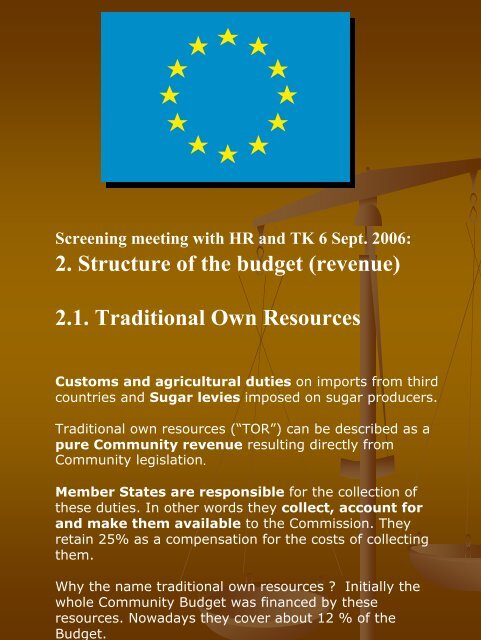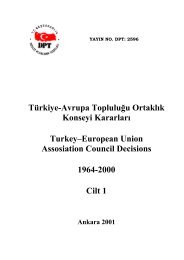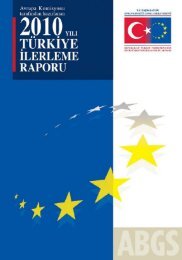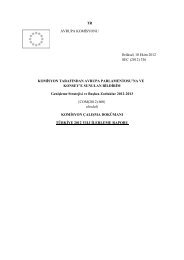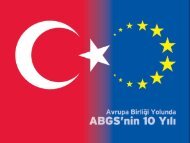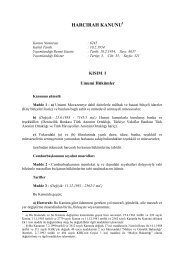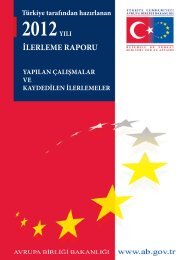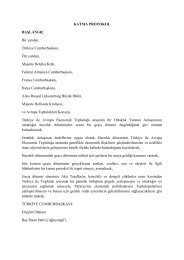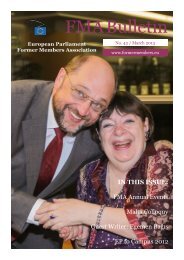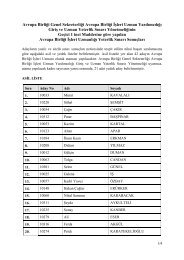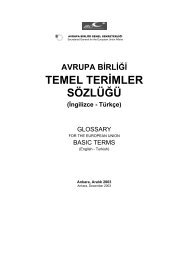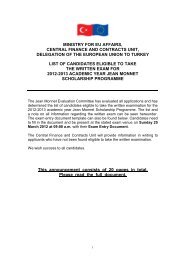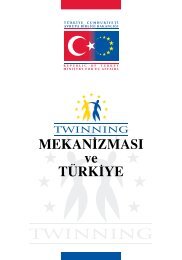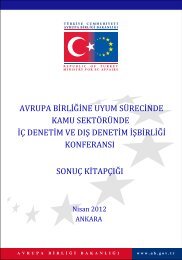2. Structure of the budget (revenue) 2.1. Traditional Own Resources
2. Structure of the budget (revenue) 2.1. Traditional Own Resources
2. Structure of the budget (revenue) 2.1. Traditional Own Resources
You also want an ePaper? Increase the reach of your titles
YUMPU automatically turns print PDFs into web optimized ePapers that Google loves.
Why <strong>the</strong> name traditional own resources ? Initially <strong>the</strong><br />
whole Community Budget was financed by <strong>the</strong>se<br />
resources. Nowadays <strong>the</strong>y cover about 12 % <strong>of</strong> <strong>the</strong><br />
Budget.<br />
Screening meeting with HR and TK 6 Sept. 2006:<br />
<strong>2.</strong> <strong>Structure</strong> <strong>of</strong> <strong>the</strong> <strong>budget</strong> (<strong>revenue</strong>)<br />
<strong>2.</strong>1. <strong>Traditional</strong> <strong>Own</strong> <strong>Resources</strong><br />
Customs and agricultural duties on imports from third<br />
countries and Sugar levies imposed on sugar producers.<br />
<strong>Traditional</strong> own resources (“TOR”) can be described as a<br />
pure Community <strong>revenue</strong> resulting directly from<br />
Community legislation.<br />
Member States are responsible for <strong>the</strong> collection <strong>of</strong><br />
<strong>the</strong>se duties. In o<strong>the</strong>r words <strong>the</strong>y collect, account for<br />
and make <strong>the</strong>m available to <strong>the</strong> Commission. They<br />
retain 25% as a compensation for <strong>the</strong> costs <strong>of</strong> collecting<br />
<strong>the</strong>m.
Legal framework<br />
<strong>Own</strong> <strong>Resources</strong><br />
Decision 2000/597/EC<br />
• Art.8(1)<br />
Reg. 1150/2000/EC<br />
Com. Dec. 97/245/EC<br />
• Implementing<br />
provisions<br />
• Transmission<br />
<strong>of</strong> info to <strong>the</strong><br />
Commission
Community Legislation<br />
• System <strong>of</strong> <strong>Own</strong> <strong>Resources</strong><br />
(a new Decision has been proposed and<br />
is currently being debated in Council)<br />
• Decision 2000/597 constitutes <strong>the</strong> legal basis for<br />
<strong>the</strong> Community <strong>Own</strong> <strong>Resources</strong> system. It defines<br />
<strong>the</strong> own resources that are entered in <strong>the</strong><br />
Community Budget.<br />
• Council Regulation 1150/2000:<br />
- Establishment, Accounting and Making<br />
available (Member States)<br />
- Control <strong>of</strong> <strong>Own</strong> <strong>Resources</strong> (Member<br />
States and Commission)<br />
• Regulation 1150/2000 implements <strong>the</strong> ORD:<br />
It deals with <strong>the</strong> way TOR are made available<br />
and with <strong>the</strong> monitoring <strong>of</strong> TOR. It tells <strong>the</strong><br />
Commission and <strong>the</strong> Member States WHAT to<br />
do and HOW to do it.
Most relevant to TOR:<br />
Regulation<br />
1150/2000<br />
24 articles<br />
• Article 2<br />
• Article 6<br />
• Article 10<br />
• Article 11<br />
• Article 17<br />
• Article 18<br />
• Art.20/21<br />
• On <strong>the</strong> one side, it tells Member States<br />
under what terms <strong>the</strong>y should make <strong>the</strong><br />
own resources <strong>the</strong>y collect available to<br />
<strong>the</strong> Commission. . On <strong>the</strong> o<strong>the</strong>r side it<br />
tells <strong>the</strong> Commission under<br />
what<br />
terms it should monitor <strong>the</strong> Member<br />
States’<br />
efforts in that respect. Thus,<br />
Regulation 1150/2000 deals specifically<br />
with <strong>the</strong> direct relation between<br />
Member States and <strong>the</strong> Commission<br />
in <strong>the</strong> field <strong>of</strong> <strong>Own</strong> <strong>Resources</strong>.<br />
• The content <strong>of</strong> its key provisions.
Making available <strong>Own</strong> <strong>Resources</strong><br />
Making available amounts <strong>of</strong> <strong>Own</strong> <strong>Resources</strong> to <strong>the</strong><br />
Commission is in fact nothing else <strong>the</strong>n putting those<br />
amounts into an account kept by member States<br />
in <strong>the</strong> name <strong>of</strong> <strong>the</strong> Commission.<br />
How do Member States make TOR available to <strong>the</strong><br />
Commission; what procedure do <strong>the</strong>y have to follow?<br />
Three questions should subsequently be answered.<br />
• Establishment <strong>of</strong> <strong>Traditional</strong> <strong>Own</strong><br />
<strong>Resources</strong> (Art. 2)<br />
1. At what moment and under what terms<br />
is <strong>the</strong> Commission actually entitled to <strong>the</strong><br />
amount <strong>of</strong> <strong>Own</strong> <strong>Resources</strong> collected by a<br />
Member State, or, in o<strong>the</strong>r words, how are<br />
<strong>the</strong>se amounts established?<br />
• Accounting (Art. 6)<br />
<strong>2.</strong> How do Member States put <strong>the</strong><br />
Commission's entitlements in <strong>the</strong>ir<br />
accounts and what accounts are used?<br />
• Making Available (Art. 10)<br />
3. Within what delay should <strong>the</strong> actual<br />
making available, that is <strong>the</strong> booking in<br />
<strong>the</strong> appropriate account in <strong>the</strong> name <strong>of</strong><br />
<strong>the</strong> Commission, take place?
Article 2<br />
Establishment <strong>of</strong> TOR<br />
The first question to be answered was:<br />
• At what moment and under what terms is <strong>the</strong><br />
entitlement <strong>of</strong> <strong>the</strong> Commission to a certain<br />
amount <strong>of</strong> <strong>Own</strong> <strong>Resources</strong> actually<br />
established?<br />
• Two basic requirements have to be met:<br />
i. Booking in national accounts (article 217<br />
Customs Code) or conditions to do so having<br />
been met<br />
(article 217-220220<br />
1. The booking in <strong>the</strong> national accounts (those are <strong>the</strong><br />
accounting ledgers Article 218 and 219 <strong>of</strong> <strong>the</strong> Community<br />
Customs Code refer to)<br />
ii. Notification to <strong>the</strong> debtor or conditions<br />
to do so having been met<br />
• <strong>2.</strong> Communication <strong>of</strong> <strong>the</strong> debt to <strong>the</strong> debtor, once <strong>the</strong><br />
debtor and <strong>the</strong> amount <strong>of</strong> <strong>the</strong> customs debt are known.<br />
• The date <strong>of</strong> <strong>the</strong> establishment <strong>of</strong> an amount <strong>of</strong> <strong>Own</strong><br />
<strong>Resources</strong> is <strong>the</strong> date <strong>of</strong> entry in <strong>the</strong> accounting ledgers<br />
provided for by Articles 218 and 219 <strong>of</strong> <strong>the</strong> Customs<br />
Code.<br />
• Accounting for TOR is not identical to accounting <strong>of</strong><br />
duties. . The Customs Code regulates <strong>the</strong> relationship<br />
debtor/national customs administration. The “accounting<br />
ledgers”<br />
Article 218 <strong>of</strong> <strong>the</strong> Customs Code speaks <strong>of</strong>,<br />
should <strong>the</strong>refore absolutely not be mistaken with <strong>the</strong><br />
special accounts Member States keep for each type <strong>of</strong> <strong>Own</strong><br />
Resource.
Article 6<br />
Accounting<br />
• Member States have to keep accounts<br />
for established TOR (<strong>the</strong> so-called A and<br />
B accounts).<br />
• “A”-AccountAccount - Every<br />
established<br />
amount. Monthly statement sent to<br />
<strong>the</strong> Commission<br />
• As a general rule <strong>the</strong> Commission is entitled<br />
to all <strong>the</strong> amounts that have been<br />
established in accordance with Article <strong>2.</strong> 2<br />
They are entered into <strong>the</strong> A-Account, A Account, at <strong>the</strong><br />
latest <strong>the</strong> first working day after <strong>the</strong> 19th<br />
day <strong>of</strong> <strong>the</strong> second month following <strong>the</strong><br />
month during which <strong>the</strong> entitlement was<br />
established.<br />
Every month, Member States have to send<br />
<strong>the</strong> Commission a statement that includes<br />
all <strong>the</strong> entries in <strong>the</strong> A-Account. Account.
Article 6<br />
Accounting<br />
• “B”-Account<br />
- Non-recovered/non<br />
recovered/non-<br />
guaranteed or guaranteed but<br />
challenged amounts. Quarterly<br />
statement sent to <strong>the</strong> Commission<br />
• An important implication <strong>of</strong> whe<strong>the</strong>r an amount<br />
is put into <strong>the</strong> A- or into <strong>the</strong> B-AccountB<br />
is <strong>the</strong><br />
difference in timing <strong>of</strong> <strong>the</strong> making available<br />
<strong>of</strong> <strong>the</strong> amount concerned.<br />
• The Customs administration should have reliable<br />
accounting procedures and systems, preferably<br />
a centralised computer accounting system<br />
directly linked to <strong>the</strong> customs clearance systems<br />
for accounting for established duties, broken<br />
down by <strong>the</strong>ir type, in <strong>the</strong> own resources A and<br />
B accounts<br />
• The department responsible for <strong>the</strong> collection <strong>of</strong><br />
sugar levies should also keep A&B accounts for<br />
<strong>the</strong> established sugar levies.
Article 10<br />
Making Available<br />
• Regulation 1150/2000 imposes <strong>the</strong> obligation<br />
on Member States to keep an account in its<br />
Treasury<br />
or <strong>the</strong> body it has appointed<br />
(usually <strong>the</strong> Central bank), free <strong>of</strong> charge,<br />
in <strong>the</strong> name <strong>of</strong> <strong>the</strong> Commission on which own<br />
resources are credited.<br />
• So, when should TOR be put into this<br />
bank account? In o<strong>the</strong>r words, when<br />
should <strong>the</strong>y be made available?<br />
• Article 10 makes a distinction between<br />
amounts put in <strong>the</strong> A-, A , and amounts put<br />
in <strong>the</strong> B-Account B<br />
kept for TOR purposes.<br />
• A-Account Account<br />
Crediting (-25%(<br />
collection costs) to <strong>the</strong><br />
Commission's account <strong>of</strong> TOR at <strong>the</strong> latest on<br />
<strong>the</strong> first working day following <strong>the</strong> 19th day<br />
<strong>of</strong> <strong>the</strong> second month following <strong>the</strong> month<br />
during which <strong>the</strong> entitlement was established<br />
(in casu recovered)<br />
example: Duties established on 5<br />
January 2006 and paid on 15 January 06<br />
are to be credited to <strong>the</strong> Commission<br />
account on 20 March at <strong>the</strong> latest.
Article 10<br />
Making Available<br />
• B-Account<br />
Entitlements shown in <strong>the</strong> B-account<br />
B<br />
(unpaid or unguaranteed<br />
or<br />
guaranteed but contested amounts)<br />
are credited to <strong>the</strong> Commission<br />
account at <strong>the</strong> latest on <strong>the</strong> first<br />
working day following <strong>the</strong> 19th day<br />
<strong>of</strong> <strong>the</strong> second month following <strong>the</strong><br />
month in which <strong>the</strong> entitlements<br />
were recovered.
Article 11<br />
Belated Interest<br />
• Member States have to pay up in time for <strong>the</strong><br />
TOR <strong>the</strong>y have collected.<br />
• Any delay in crediting <strong>the</strong> Commission<br />
account shall give rise to <strong>the</strong> payment <strong>of</strong><br />
interest by <strong>the</strong> Member State concerned.<br />
• Example:<br />
•------------•-----------•------------•<br />
Jan ↑ Feb Mar ↑ Apr<br />
Debt established in January is to be entered<br />
in <strong>the</strong> A account and credited to <strong>the</strong><br />
Commission account on 20 March at <strong>the</strong><br />
latest. Interest is charged for any payment<br />
later than <strong>the</strong> 1st working day after 19<br />
March.<br />
• The interest rate is <strong>the</strong> rate applied by <strong>the</strong><br />
ECB (or <strong>the</strong> Central bank for Member States<br />
not belonging to <strong>the</strong> Euro zone) to its<br />
refinancing operations, on <strong>the</strong> first day <strong>of</strong> <strong>the</strong><br />
month in which <strong>the</strong> due date fell, increased<br />
by two percentage points. This rate shall<br />
be increased by 0,25% for each month <strong>of</strong><br />
delay. . The increased rate is applied to <strong>the</strong><br />
entire period <strong>of</strong> delay.
Monitoring <strong>Own</strong><br />
<strong>Resources</strong><br />
• Annual Reports by Member<br />
States (Article 17)<br />
• Inspection modalities <strong>of</strong><br />
Member States and<br />
Commission (Article 18):<br />
1. MS Control activities<br />
<strong>2.</strong> Associate Controls MS + Cie<br />
3. Autonomous Controls by Cie
Article 17<br />
Annual Reports by Member States<br />
• Obligation MS to take all requisite measures to<br />
make available<br />
• '1. Member States shall take all requisite measures to ensure<br />
that <strong>the</strong> amount corresponding to <strong>the</strong> entitlements<br />
established under Article 2 are made available to <strong>the</strong><br />
Commission (…)'.(<br />
• Exceptions (Write(<br />
Write-<strong>of</strong>f Cases)<br />
i. Force majeure<br />
ii.<br />
Special circumstances<br />
• Despite due diligence no recovery<br />
Member States shall be released from <strong>the</strong> obligation to make available<br />
established own resources which prove irrecoverable for o<strong>the</strong>r reasons<br />
which cannot be attributed to <strong>the</strong>m'.<br />
Amounts <strong>of</strong> established entitlements shall be declared irrecoverable by an<br />
administrative decision or deemed irrecoverable, at <strong>the</strong> latest, five years<br />
after <strong>the</strong> establishment <strong>of</strong> <strong>the</strong> amount, or, in <strong>the</strong> event <strong>of</strong> an appeal, after<br />
<strong>the</strong> final decision, or after <strong>the</strong> last partial payment not clearing <strong>the</strong> debt.<br />
Amounts declared or deemed irrecoverable shall be removed from <strong>the</strong> t<br />
B<br />
account.<br />
• Member states inform Commission within 3 months<br />
Within three months after <strong>the</strong> write-<strong>of</strong>f, Member States shall inform <strong>the</strong><br />
Commission <strong>of</strong> written-<strong>of</strong>f entitlements <strong>of</strong> over €50,000. This report shall<br />
include all <strong>the</strong> facts necessary for an examination <strong>of</strong> <strong>the</strong> reasons s <strong>of</strong><br />
irrecoverability.<br />
• Commission decides within 6 months<br />
The Commission has six months from <strong>the</strong> receipt <strong>of</strong> <strong>the</strong> report (…) to<br />
forward its comments to <strong>the</strong> Member State concerned'.
Article 18<br />
Inspection Methods<br />
• Inspections by Member States<br />
• 1. Member States shall conduct <strong>the</strong> checks and enquiries<br />
concerning <strong>the</strong> establishment and <strong>the</strong> making available <strong>of</strong> <strong>the</strong><br />
own resources referred to in Article 2(1)(a) and (b) <strong>of</strong> Decision<br />
94/728/EC, Euratom.<br />
• Associated inspections with <strong>the</strong> Commission<br />
• <strong>2.</strong> Member States shall:<br />
(a) carry out additional inspection measures at <strong>the</strong><br />
Commission's request.<br />
(b) associate <strong>the</strong> Commission, , at its request, with <strong>the</strong><br />
inspection measures which <strong>the</strong>y carry out.<br />
Member States take all steps required to facilitate <strong>the</strong>se<br />
inspection measures.<br />
• Autonomous inspections by <strong>the</strong> Commission on <strong>the</strong><br />
spot<br />
• 3. Commission may itself carry out inspection measures on<br />
<strong>the</strong> spot. The agents authorised by <strong>the</strong> Commission for such<br />
inspection measures shall have access, in so far as <strong>the</strong> correct<br />
application <strong>of</strong> this Regulation so requires, to <strong>the</strong> supporting<br />
documents referred to in Article 3 and to any o<strong>the</strong>r<br />
appropriate document connected with those supporting<br />
documents. The Commission shall give notice <strong>of</strong> this inspection<br />
in good time to <strong>the</strong> Member State in which <strong>the</strong> inspection<br />
measure is to take place. Agents <strong>of</strong> <strong>the</strong> Member State<br />
concerned shall participate in such inspection measures.<br />
• Commission reports to Budget Authority<br />
• 5. The Commission shall report every three years to <strong>the</strong><br />
European Parliament and to <strong>the</strong> Council on <strong>the</strong> functioning <strong>of</strong><br />
<strong>the</strong> inspection arrangements.Triennial report
Articles 20 & 21<br />
ACOR<br />
• Advisory<br />
Committee on <strong>the</strong> Communities’<br />
<strong>Own</strong><br />
<strong>Resources</strong><br />
• Representatives <strong>of</strong> Member States and<br />
Commission<br />
• Chaired by <strong>the</strong> Commission<br />
• Several meetings a year<br />
• Topics, amongst o<strong>the</strong>rs:<br />
Reports (Article 6, 17 and 18)<br />
Inspections (Article 18)
THE END


